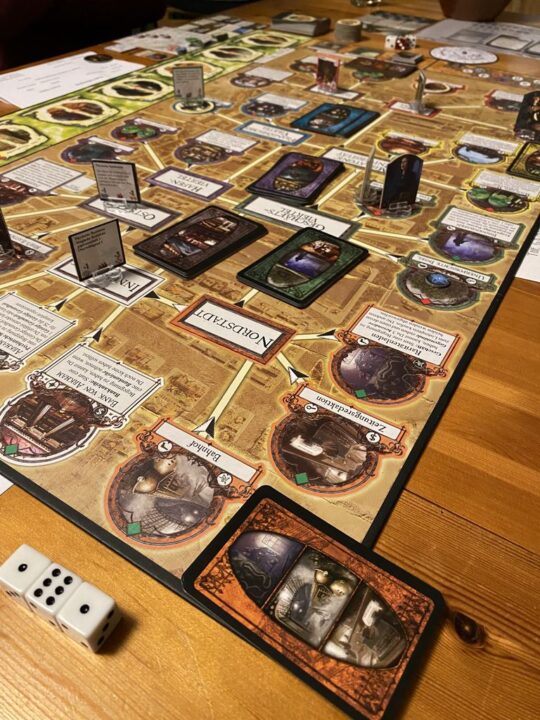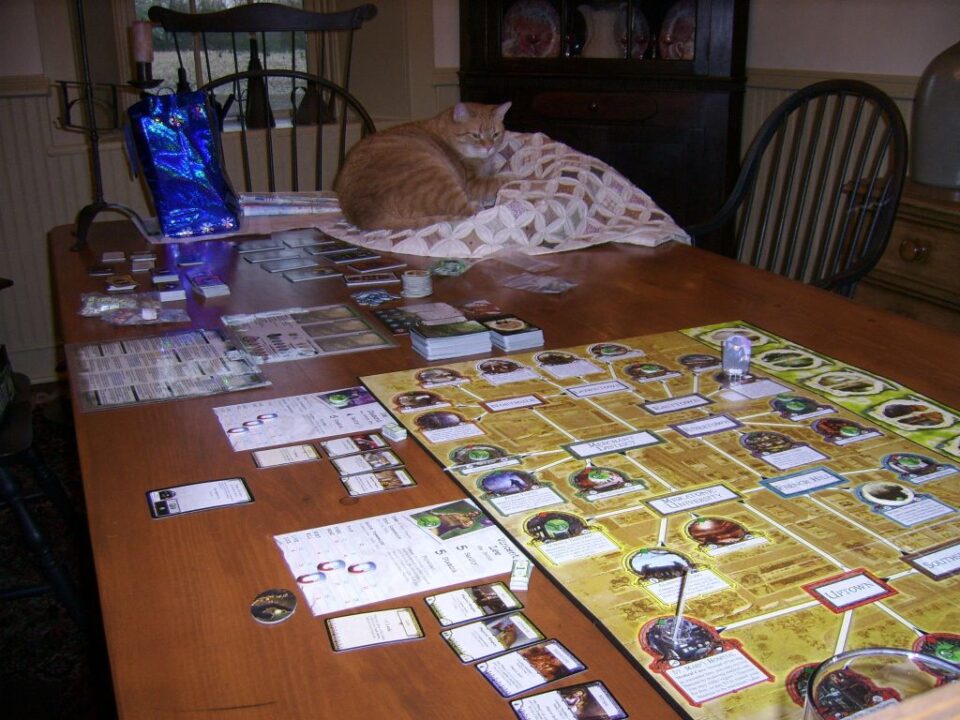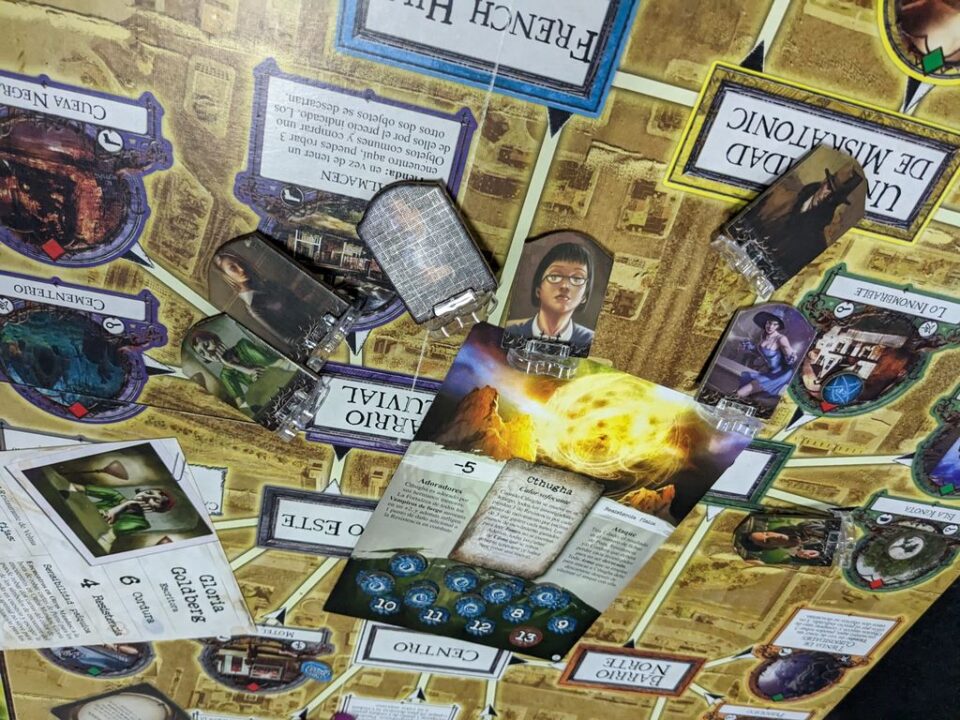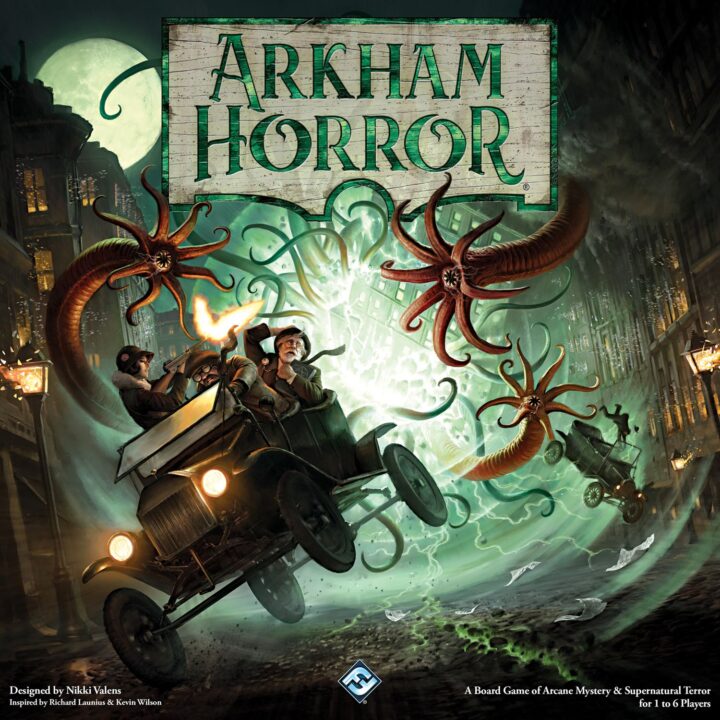Overview
Enter the eldritch world of Arkham Horror, a game where mystic horror is matched by deep strategic gameplay. This review dives into the enduring classic, pulling apart the intricate game mechanics, the cooperative play dynamics central to its pathos, and the sensational replayability that beckons the brave to partake again. Arkham Horror not only commands your attention through its complex systems but also manages to tighten the bonds of friendship around the table with its cooperative nature. So, gather your wits and your allies; our in-depth exploration begins with its challenging and rewarding game mechanics complexity.
How It Plays
Setting Up
Arkham Horror begins with players selecting their investigators and setting up the board, which represents the eerie town of Arkham. Components are sorted, clues are placed, and gates to other dimensions may open at various locations.
Gameplay
Players then cooperate, moving through Arkham, gathering resources, acquiring items, and battling eldritch beings. For each turn, players choose between actions like investigating, healing, and fighting—all crucial tactics to prevent the awakening of the Ancient One.
Winning the Game
To win, players must work together to solve mysteries whilst striving to keep their sanity. If the team successfully prevents the Ancient One from awakening, the horror is held at bay, and victory is claimed; otherwise, it results in grim failure for all.
Want to know more? Read our extensive strategy guide for Arkham Horror.
Arkham Horror Review: Navigating Complexity
One aspect of game mechanics that consistently hooks me is complexity, and Arkham Horror is a prime example. The first time I unfurled its myriad components across my dining table, I was intimidated, yet incredibly intrigued. Intertwining Rules are at the heart of Arkham’s charm. Each playthrough teaches me something new, reinforcing that mastery lies within understanding its moving parts, from spell-casting to tackling bizarre creatures.
However, complexity should be a dance, not a duel. Initially, Arkham Horror felt like the latter. I recall nights we spent more time thumbing the rulebook than playing. But in these moments, a profound learning experience unfolded. The game morphed into a teacher, its complexities lessons to embrace rather than fear. Adaptability in strategy became our mantra; each session grew smoother, tactics sharpened with finesse rather than brute force study.
Complexity, when designed like Arkham Horror’s, is not just a source of challenge; it’s a framework for narrative and personal interaction. Now, let’s turn to how these strategic intricacies pave the way for Trust in Cooperative Play Dynamics.

Fostering Camaraderie through Gaming
Sometimes, it’s not just about winning; it’s about the collective journey there. In my review process for Arkham Horror, I’m consistently charmed by its commitment to unity in player actions. Collaborative Strategy embodies not simply a group of friends pondering over a board; it represents a singular beast with many heads, each whispering plans and scenarios. Amidst the eldritch chaos of Arkham Horror, the need for cooperative ingenuity shines – each player’s decision threads into the wider tapestry of the group’s path to victory.
Genuine Team Challenges
Then there’s the tension – magnifique! And it truly does surface innovatively when a particularly gruesome Old One leers from the game board. We, as a quasi-academic society of investigators, must bilaterally decide: who will step into the dimensional breach? Choices made with heads huddled close because, in Arkham, isolation is the real enemy. To glimpse into the versatility and enduring charm, one must sail into the next piece sought by many an enquiring mind – Replayability and Variability.

Never the Same Game Twice
When it comes to board games, the promise of a new adventure each playthrough acts as a siren song to gamers everywhere. Arkham Horror is a masterclass in replayability. With a plethora of different villains and an ever-expanding series of expansions, each session unfolds drastically different than the last.
Variety is the Spice of Gaming
The sheer diversity in game scenarios keeps the cogs of your mind turning. Just last week, our gaming group tackled a near-impossible scenario. Despite our seasoned history with the game, Arkham Horror threw us curveballs that felt fresh and challenging, catapulting us into heated strategic debates and camaraderie.
Endless Worlds to Explore
But what’s absolutely stellar is the variable setup. Permutations of ancient ones, investigators, and random event draw decks assure that replayability isn’t just a marketing buzzword—it’s a reality. For these reasons, I wholeheartedly champion Arkham Horror as a colossus in the realm of board games worth their spot on your shelf.

Conclusion
Concluding this review, Arkham Horror is a board game that richly melds complex mechanics with compelling cooperative play, all while maintaining a high replay value. The game’s ability to consistently create unique narrative threads and puzzling challenges speaks to its expansive variability, keeping each session fresh and engaging. It’s a journey of strategy, solidarity, and the occult that continues to draw players back to the table time and again. For enthusiasts of thematic board games that saddle the line between intricate gameplay and community-building experiences, Arkham Horror is an odyssey worth embarking on—with the caveat of a commitment to its sprawling layers of involvement. A fitting epitome for any collection that craves depth and camaraderie amidst the mythos of Lovecraftian lore.


